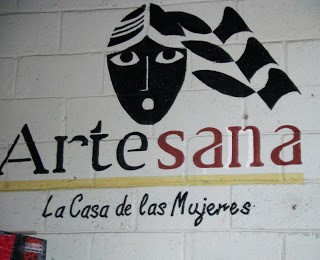Global Solidarity Retreat
with Sandra Moran, Artesana
September 26-28, 2014; ongoing solidarity into 2015 and beyond
summary report (pdf) | full report (pdf)

The Artesana Global Solidarity Retreat, held Sept 26 – 28th on Gambier Island, provided an opportunity for people from the Lower mainland to explore issues related to international solidarity with feminist, artist and activist Sandra Moran from the Guatemalan women’s rights organization Artesana. Sandra is also the representative for the Americas for the World March of Women. The retreat was coordinated by CoDevelopment Canada.
A diverse group of 11 women gathered to build relationships between each other and Sandra, build understanding of the work of Artesana, deepen understanding of global solidarity, and make plans for how to work together over the next 6 months. We shared delicious meals and thoughts on solidarity, went swimming / kayaking, learned about Sandra’s work, played in the night-time phosphorescence, sang songs around a campfire – and made plans for ongoing work with Sandra Moran and Artesana.
For more background on Sandra Moran, see Sandra Moran and Artesana – background. For a copy of the participant application form, Global Solidarity Retreat – application package.
Retreat Goals
The following goals were established prior to the retreat by co-facilitators, in collaboration with staff at CoDevelopment Canada:
- Build relationships between participants and Sandra Moran
- Build understanding of and/or commitment to the work of Artesana
- Deepen understanding of global solidarity in the current context
- Make plans for how to work together for the next 6 months
- Enjoy Gambier Island, in beautiful Howe Sound
Who participated?
There were a total of 11 people in attendance, ages 18 – 60+. Four of those participating were supporting the overall project: Sandra (co-facilitator), Kathi (Canadian contact and co-facilitator), Carmen (interpreter), and Mali (supporting facilitator). Participants were asked to contribute a fee.
The other seven participants were from a wide variety of backgrounds. Two were teaching at universities (Capilano and Vancouver Island university), one as a nurse in the downtown eastside. Two participants were students – one high school and one undergraduate – and one participant brought along her 1-year-old son. Participants, all living in British Columbia, came from Mayan, Guatemalan, Chilean, Scottish, Korean, and German heritage. All of the participants learned of the event through their networks: three through CoDev’s networks; two through Capilano’s Global Stewardship program; and one through Amnesty International’s listserv.

What happened?
Over the course of a 3-day retreat, the group had an opportunity to gather and share inspiration and energy. The weekend was woven together by opening and closing circles, including a candle ceremony lead by Sandra. At some point almost everyone took to the water – kayaking, canoing, or swimming.
The weekend began by coming to a collective understanding of ‘solidarity’ and understanding Sandra’s approach and work, and moved toward collective action, identifying solidarity directions and ideas that those in the room were willing to invest time into. By the end of the afternoon on Sunday, participants had come up with a long list of ways they aim to continue to work in solidarity. Some of those plans include meeting again as a group, building collaboration with women’s, planning fundraisers with the Vancouver Mayan community, setting up an art project exchange, and supporting Artesana’s research priorities in Guatemala.


Preliminary Learnings and Future Possibilities
Overall, it seems the structure and process of the weekend worked well – moving from big-picture visioning on Saturday into action-planning on Sunday. Some aspects of this retreat are unique to the context: a relationship of more than 20 years between Sandra and Kathi; Sandra’s strong English language ability, meaning interpretation needs were minimal; and multiple strong relationships between Sandra and solidarity work in British Columbia. In addition, Sandra and Kathi both have previous experience facilitating retreats.
The September 26-28 retreat was framed as building solidarity in a general sense with Sandra’s work, rather than supporting the work of any one organization. CoDevelopment Canada took the lead on making the solidarity retreat happen and has a 10-year relationship with Sandra and Artesana; other groups also connected include the Highlands United Church and BC CASA. The intention of the solidarity retreat is to build solidarity, and this retreat had three potential outcomes – solidarity directly through CoDev, through BC CASA, or independently of either group. As it turns out, all three of these avenues are being pursued by the current group. Finding a way to ensure participants are familiar with significant and existing solidarity work underway, as well as ways that participants can become involved in this work, is an important area of focus for the current group and for future solidarity retreats.
A future retreat may include both men and women, and may involve a more substantive presence from CoDev, or the organization involved, would be beneficial to participants and the organization.
While recognizing that the ongoing process of being in solidarity has just begun, this combination of a remarkable group of women, skilled facilitation, and an idyllic getaway made for a truly remarkable weekend. The ideas shared and relationships built are a foundation for ongoing solidarity not only in the months but in years to come.
For more background on Global Solidarity Retreats in general, see this page. If you have thoughts about the Artesana retreat, suggestions for future retreats, or just want to be in touch – email global.solidarity.retreat@gmail.com.



